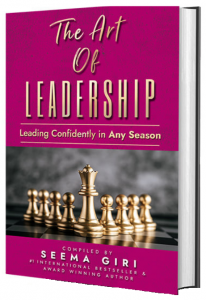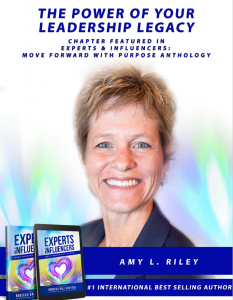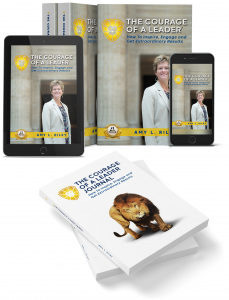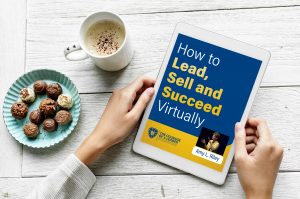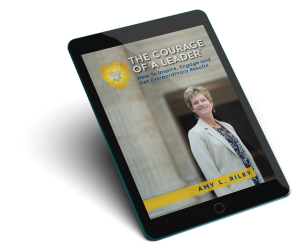It’s Powerful Collaboration for Extraordinary Results week!
My guest today on The Courage of a Leader podcast is Valerie Mrak. We delved into 5 principles to bridge any communication divide, including generational gaps, functional silos, and conflicts. With each principle, we highlighted the specific significance in creating productive partnerships and transforming exhausted relationships.
Valerie is clearly committed to, passionate about, and experienced in helping people transform conflict. She enables teams and individuals to go from inaction and fighting to action and resourceful collaboration.
This is not an episode to miss!
About the Guest:
Valerie Mrak is a conflict transformation specialist, who takes exhausted, frustrated relationships and helps her clients transform them into productive partnerships. She empowers teams and individuals to move from inaction and infighting to action and creative collaboration.
She is a TEDx and international speaker, award-winning filmmaker and leadership coach who has empowered thousands across the globe to transform their business and personal relationships through creating mutual possibility. A bestselling author, Valerie has been featured on podcasts, radio and in publications such as the Chicago Tribune, and has more than a dozen years’ experience coaching, speaking and training.
Her clients have included AT&T, The National Park Service, Boys & Girls Clubs of America, Rotary International and PBS. She is most proud of her work with His Holiness the Dalai Lama and several other Nobel Peace Prize Winners.
The best way to reach Valerie is through this Calendly link https://calendly.com/mrakulous
About the Host:
Amy L. Riley is an internationally renowned speaker, author and consultant. She has over 2 decades of experience developing leaders at all levels. Her clients include Cisco Systems, Deloitte and Barclays.
As a trusted leadership coach and consultant, Amy has worked with hundreds of leaders one-on-one, and thousands more as part of a group, to fully step into their leadership, create amazing teams and achieve extraordinary results.
Amy’s most popular keynote speeches are:
- The Courage of a Leader: The Power of a Leadership Legacy
- The Courage of a Leader: Create a Competitive Advantage with Sustainable, Results-Producing Cross-System Collaboration
- The Courage of a Leader: Accelerate Trust with Your Team, Customers and Community
- The Courage of a Leader: How to Build a Happy and Successful Hybrid Team
Her new book is a #1 international best-seller and is entitled, The Courage of a Leader: How to Inspire, Engage and Get Extraordinary Results.
https://www.linkedin.com/in/amyshoopriley/
Resources mentioned in the podcast
The Inspire Your Team assessment (the courage assessment): https://courageofaleader.com/inspireyourteam/
Thanks for listening!
Thanks so much for listening to The Courage of a Leader podcast! If you got inspired and/or got valuable leadership techniques you can use from this episode and think that others could benefit from listening, please share using the social media buttons on this page.
Do you have questions or feedback about this episode? Leave a comment in the section below!
Subscribe to the podcast
If you would like to get automatic updates of new The Courage of a Leader podcast episodes, you can subscribe to the podcast on Apple Podcasts. You can also subscribe in your favorite podcast app.
Leave us an Apple Podcasts review
Ratings and reviews from our listeners are extremely valuable to us and greatly appreciated. They help our podcast rank higher on Apple Podcasts, which helps us ignite The Courage of a Leader in more leaders! Please take a minute and leave an honest review on Apple Podcasts.
Teaser for next episode
Stay tuned for our next guest podcast episode – The Uncertainty Advantage: Counter-Intuitive Secrets of Parallel Problem-Solving and Powerful Purpose – with Michael Gardon, a 3-time entrepreneur and the creator of The Break Community on Careercloud.com where he is guiding a 14,000+ strong community to break through work barriers and live purposefully.
Transcript
Valerie Mrak is committed to passionate about and experienced in helping people transform conflict. She enables teams and individuals to go from inaction and fighting to action and resourceful collaboration. listen in to discover the five principles to bridge any communication divide.
Amy Riley:Welcome to the Courage of a Leader podcast. This is where you hear real life stories of top leaders achieving extraordinary results. And you get practical advice and techniques, you can immediately apply for your own success. This is where you will get inspired. And take bold, courageous action. I am so glad you can join us. I'm your host, Amy Riley. Now, are you ready to step into the full power of your leadership and achieve the results you care about most? Let's ignite the Courage of a Leader.
Amy Riley:Valerie, thank you for being with me here today on the Courage of a Leader podcast.
Valerie Mrak:It is absolutely a pleasure to be with you, Amy,
Amy Riley:I am looking forward to this conversation. Everyone, you need to know that Valerie is focused on supporting others to create peace and power and possibility in a variety of situations. So we're going to talk about the principles that she has created over time to bridge the communication divide. Right? There are many communication divides in our world in all of our lives. So before we get into the principles, I want to invite all of you as listeners to identify what possible communication divides, you might be working to bridge, it could be a generational gap. It could be functional silos. Right? How do we bridge the gap between those people who are different than us, they have different frames of reference or different experiences, or different perspectives. So take just a heartbeat here and identify in what possible relationships and situations might you want to apply these principles that Valerie is going to share with us to bridge a communication divide. All right, a big lead in there, Valerie, but I wanted people thinking about where can we apply this? And I'll be looking for myself. So what are the principles? And why are they important? All
Valerie Mrak:right, the principles there are five great principles are first. Well, you know what I shouldn't say first, okay, rise together, they can rise separately. The important thing is to start somewhere. Great. So I would say listen, yep. And that's listen without judgment. That's, that's a skill. It can be learned. We don't typically learn it. And then look, and by look, I mean, you might see with your own two eyes something and make a judgement about it, or in your own experience, look at something in your own experience. And that doesn't mean that you see the whole picture. shift your perspective and then laugh, why is laugh appropriate, even in a conflictual situation? By laughing You know, I've interviewed the Dalai Lama. And I've interviewed a Nobel Peace Prize winners who had been imprisoned, exiled, tortured, like really horrible things have happened. And every single one of them has lightheartedness. right there underneath the surface. And the value that yeah, and and I'll share more about why we should value that to beautiful and then love. And again, love in like the workplace or with my vendor, or what are you talking about? The Wharton School of Business at the end in Pennsylvania studies, the appropriateness of love me and got a kind of love in the workplace. That yeah, that people respond to people that they like and they have a simpatico with that doesn't mean you know you have to be popular. means you have to be like being human. And then the last one is leap. And leap stands for if you wait around for that person that you're in conflict with, or you're dreading to talk to, or whatever to make the first move. And guess what? It's not going to happen. You be the one be the one be the one.
Amy Riley:rship coach who has empowered:Valerie Mrak:That's a great question. And yes, that's right. Did you know that on average, so that means even the best of us, right are in that average? Remember, only 10% of what we hear 10% because we aren't paying attention, because we're thinking about what we want to say or you know, there's that grocery shopping, you've got to do or, or whatever. So, when you listen, to recreate the person, you are spending their full attention. And that doesn't mean parroting back and forth. Like I'm so mad at blah, blah, blah. And I'm so mad at blah, blah, I know, you agree create what you heard the person say, in intent. And when you're listening for that, and then you share what you heard with them. They get gotten. And when they feel gotten when they feel listened to magic happens, they're ready and willing to listen to you.
Amy Riley:Yeah. Can you give us an example of what that might sound like Valerie? Sure.
Valerie Mrak:You just asked me what that might sound like. So I could say, alright, I hear that you would like to have me repeat what I said to cement what it was that I intended. Something like that.
Amy Riley:I think sometimes people get worried that when they're summarizing in their own words, that they're not going to get it quite right. Would you suggest that people go ahead and say things like, oh, that sounds like this has been frustrating for you. Right? I get that this and this are pain points for you.
Valerie Mrak:Absolutely. Because that other person will understand that they really truly have your attention and intention. Okay. And if
Amy Riley:I don't get it quite right, then the other person could be asked that so much frustration, really, I'm disappointed. Exactly what has happened here or whatever it might be. I know we wanted to spend some time talking about looking in particular. And you frame this up really nice for us when we look initially I'm looking for my experience. I'm looking through my filter, and I've got to recognize I might not see everything in that moment. So how do we broaden our view? Valerie?
Valerie Mrak:I've got a good example. So I'm wearing this necklace, right? Yeah. This wasn't intentional, by the way. And so if you were to describe this necklace, how would you describe it? Oh,
Amy Riley:we've got a blue gem up top. We've got a light blue gem dangling from there. And that bottom gem is surrounded by a silver circle.
Valerie Mrak:Okay, great. Now, if I were wearing a different outfit, or something like that, I might turn it around. Haha. Oh, describe it.
Amy Riley:Yeah, now we've got a burnt orange gem up top. And maybe that looks like a deep green gem below it or maybe black. Have you have a black cardigan on today? So maybe it's making it look? Black? Yeah. Different colors.
Valerie Mrak:Right. So. So this, I honestly did not intend that today.
Amy Riley:It's a really cool.
Valerie Mrak:So you don't have eyes in the back of your head. You can't really see everything that's there. For some reason we got created with eyes in front of our head. I know they don't go 360 degrees like an owl. We can't see everything. And that's true of our experiential perspective as well.
Amy Riley:Yeah, well, and Valerie, you're telling me even though the eyes are in the front of my head, and I can see your necklace from this view. I didn't know everything that was available there. Even when I feel like I'm clearly looking at it.
Valerie Mrak:Right. So change your view. Someone
Amy Riley:said this once and I've repeated it that pretend like we're around a small conference table. And there's one of those big beach balls that has the different colored stripes on it. If I'm right up against the ball, I might only be seeing the blue from that blue stripe. You on the opposite side of the table might only be seeing the red. Exactly and understand that there's all these different color stripes unless we talk to people about their experience. Exam Exactly. So I'm hearing slow down. Ask questions. And get into that listen without judgment to hear what others perspectives are. Beautiful. Yep,
Valerie Mrak:exactly.
Amy Riley:laugh I love how you talk about the lightheartedness. I am. I love to laugh, but I can tell you Valerie sometimes I forget. And I get all significant. I get all serious about the work at hand and we got to figure it out. And I need someone to lighten me up. How do we bring laugh?
Valerie Mrak:Well, first of all, did you know that adults laugh 95% less than children? Oh 95% less. And we laugh fewer times on workdays than we do on weekends. Of course.
Amy Riley:You're interesting. You're great with these statistics. These these these are not fun ones. No, they
Valerie Mrak:aren't. Isn't that just like it's horrid? Yeah, pretty, so serious. Yeah, humor. And we're not we're not talking about learning to be jokesters. We're not talking about coming in and you know, gathering your customers or your co workers and telling them you know, a nice laughing joke. Part of humor is telling the truth. At Stanford University School of Business, there is a class that's taught by a behavioral psychologist and a business consultant on humor. Oh, good. And that's what these in the place of it in the workplace and that's what they say, tell the truth. If you're on this zoom call, and you're a maths except here, tell the truth. Like oh, well, I only come to my bangs in the morning. Like the rest of my aunt is a mess. It's just it just makes you human. It allows you to share in the absurdity of being human sometimes.
Amy Riley:Okay, Valerie in that spirit, is sometimes when there's conflict with myself and my husband. He will say something funny about the situation. And it can loosen me up in that moment. And when I didn't think there was any possibility I was ready to go down the I am right in the situation train. And he gets me to, to stop in my tracks when he when he says something humorous. Okay and love. Oh my gosh, if we if we've got to divide here how do we find access to love because it might feel so far away in that moment.
Valerie Mrak:So love again, it's not the oh I love you know, it's agape love. We're all on this blue marble together kind of being nests. In the word again, I'm going to cite the Wharton School of Business. Okay. Did you know that 95% of turnover at a workplace is due to stress. When you're creating a atmosphere of an agape kind of love, people feel included. They feel that it's okay to make a mistake. Like they're going to be fired or yelled at or ridiculed or you know, and because people do make mistakes, right? Yeah. Right. And also, according to Gallup $300 billion, get lost in productivity due to stress every year. That's a lot. So there's a bottom line to these five principles. When you can create a family or a business or a not for profit initiative that utilizes these principles as a way to deal with each other to be with each other. I like the word B versus DL. It makes all the difference in workability. Yes.
Amy Riley:So if we've got a conflict or different views going on, let's say with folks from another department, connecting with their humanity. And if a mistake happens, like too often we're like, okay, that's another piece of evidence why this isn't working, why they don't get it. Instead, you're saying connect with the humanity of it. And then like you said, these are not in chronological order, right, then we're looking, how might it possibly be from their perspective? Let's listen to how it could be, from their perspective. Engage in a curious dialogue, where we're bringing some of these principles. Yep, perfect. Lovely. Yeah. And I see how they overlap and play together. And easy to remember, because they all start with L. Okay, leap. Oh, it's so easy, Valerie to think I'm going to make this worse. If I say something, oh, it's not gonna go anywhere, like the last couple of conversations haven't gone? Well. It's very easy to stay in my corner, and not leap into or towards another person or party. How do we leap?
Valerie Mrak:Well, first of all, I'm going to talk about something not like kind of a skew to what you just asked, when you say wake up in the morning, and you are dreading having a particular conversation. What's happening inside your body, dreading this conversation? Is you're dumping cortisol into your system? Yes. And what is cortisol? Cortisol is a thing that ages us, it can affect our heart, it can affect our indigestion, and it keeps being dumped into our system for six hours. Just selfishly, you wake up, and you're still dreading that conversation and you say to yourself, I'm going to be the one. I'm going to be the one that changes this. I'm going to be curious, I'm going to listen, I'm going to look, you can cut that morning cortisol routine right out of your body right out of your life.
Amy Riley:Yeah, yeah. You are giving us a lot of great rationale about why we want to listen look, laugh, love and leap that humans only remember 10% of what we hear, we laugh 95% Less as, as adults than we did as children. And we laugh less on our work days 95% of turnover is due to stress 300 billion lost annually in productivity due to stress. And if you're experiencing that stress hormone of cortisol, that's continuing to be released for six hours. So these are personal and systemic reasons why we want to operate differently here. Okay, so Valerie, a lot of great things to think about across all of the principles. Let's say I want to bridge a divide. How do I prepare? How do I get in the right mindset for my next interaction with that person?
Valerie Mrak:Well, you can do first of all, is to take a breath. And to understand that you are really kind of going on a journey. You're going on a journey of two beings meeting at the point of being, we're not human doings. We're human beings. Yes. And we often get lost in the doo doo doo doo doo. How do I, you know, make this happen? Take a deep breath. And move in at wherever you feel comfortable. That might be looking, saying, I'd like to hear more from your perspective. Or it may be used a little humor. I don't know. Do you know how much do you know what I do to get ready to come into work every day? Oh, my goodness, I don't know, just anything. And I would also recommend that maybe you don't start with the hardest person in your life. Okay? Start with the second or third hardest person in your life. See what happens, see how they light up when they're being listened to when they feel that when they've got your interest in your attention and your respect, because that's what happens when you listen. And it will give you the courage and the conviction that it'll work in other areas with other people. Lovely,
Amy Riley:yes, build some momentum. So taking a breath, that also helps in our brains. When our brains recognize our brains built for survival, recognize that the human being is not running from a tiger in this moment. So I can stop releasing cortisol for the moment, and I can let the brain activity come out of fight flight or freeze and go into the prefrontal cortex so we can actually think and listen. Right, so breathing, I'm hearing that's also grounding us in the fact that we are human being connecting and talking with another human being. Exactly.
Valerie Mrak:Another thing I want to point out to Amy is that all of the ways we have to deal with conflict that we know of in our culture, and largely in our world. Yes, their fight flight, freeze, appease types of things, and we learn that in our lives, it's not only ancestral, but we also learn it in our lives before we have language. Okay, when we're little, when everybody else is a whole lot taller, and a whole lot more powerful than us. We learn specific ways to handle conflict that gets us I don't want to use the word free but you know, we get it like solves the problem for now. Okay, it gets us out of trouble or, or whatever, whenever. And so we never grow those conversations up. We never grow that way of reacting up that we did even before we had language when we didn't have any power. And so this is an opportunity. Listen, look, laugh love leap is an opportunity to grow the conversation about conflict up and
Amy Riley:to grow and develop new skills, new muscles, new ways of being inside of us. Right because we're naturally reverting to, I don't know the two year old a three year old version of how Amy He dealt with conflict. Lovely. Thank you, Valerie for everything that you've shared during this conversation and I want to let listeners know that you can find a Calendly link of Valerie's in the show notes. She wants you to see possibility in your relationships. So if you're not seeing possibility, reach out. Valerie's got the experience and the expertise to support you. Thank you for this valuable conversation. Valerie.
Valerie Mrak:Thank you, Amy. It's been a delight to speak with you.
Amy Riley:Yes, for me too. Thank you. Thank you for listening to the Courage of a Leader podcast. If you'd like to further explore this episode's topic, please reach out to me through the Courage of a Leader website at www.courageofaleader.com. I'd love to hear from you. Please take the time to leave a review on iTunes. That helps us expand our reach and get more people fully stepping into their leadership potential. Until next time, be bold and be brave because you've got the Courage of a Leader


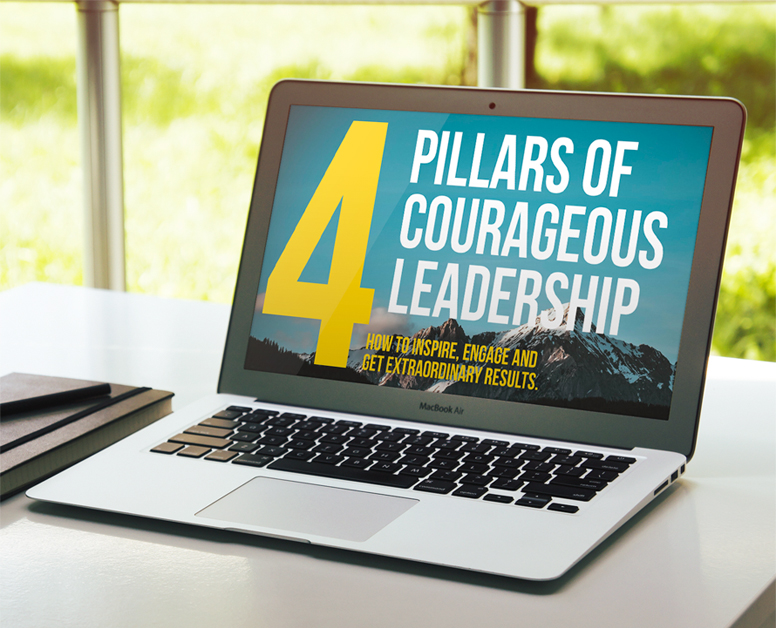 A Summary of The Courage of a Leader® 4 Pillars
A Summary of The Courage of a Leader® 4 Pillars